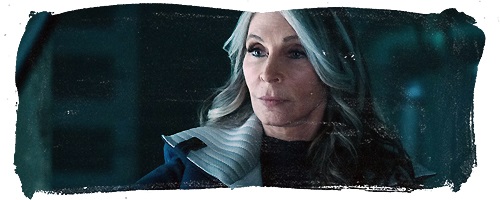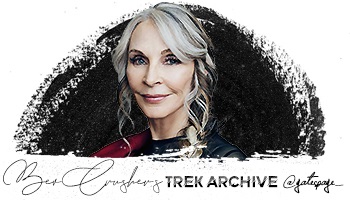
MarcusW
May 27, 2017
In 1987 Star Trek: The Next Generation took up the Star Trek mantle and proceeded to create a series that stands shoulder to shoulder with the Original Series, with a fanbase still passionate about it to this day and spawning several movies with the cast of the Next Generation. At this years SF Ball I had a chance to sit down with two pivotal cast members of Star Trek: The Next Generation, Gates McFadden who played Dr. Beverley Crusher and Patti Yasutake who played Nurse Alyssa Ogawa, to talk Star Trek, the fans and Next Generation’s lasting impact.
Marcus Wood: I’m speaking to you at the SF Ball and I know you do a few Star Trek and Sci-Fi conventions elsewhere, what do you think the value is to the fans, to Sci-Fi in general of these kind of conventions?
Gates McFadden: Well I’ve travelled a long journey about that, in the beginning I thought it was really just strange and weird. Why would somebody want my autograph? But now I totally get it, it’s a whole community, it’s a group of people who are really futurists and want to believe in a positive future and they’re also people who have gotten to know each other and there’s real groups of friends and they come and they have fun and they also talk about things that interest them. So now I get it, it’s having a hobby, it’s having a passion. It’s also something that becomes part of people’s lives, the way they think about issues and all sorts of things so I think it’s really awesome right now.
Patti Yasutake: I think it’s for the connection, especially now with the internet, there’s so many ways to connect that aren’t human to human or live. I think it’s great that they still want to get together, have their reunion and really be with each other and just have fun, it feels grounding to me. It’s not just out there in how many characters or whatever that you’re exchanging but that you’re actually staying up until three in the morning with your friends and having a good time about something that you both care about and can think of as a lark on the one hand, but on the other hand if you want to have a more serious discussion about it aswell, the whole nine yards, so I think that’s what I tend to experience going to some of these.
MW: I’m not sure the Internet always does the human connection too well.
GM: Exactly, like we were saying you meet people, you meet someone who has become a surgeon because of the character or become a nurse because of the character of Ogawa. I have also met a lot of people who are taking care of others or foster children, I met someone once, he was very nervous, he said “I just wanted to shake your hand because when I went into the foster home when I was seven years old you were on the television and your face was there and I think it just sort of imprinted and you became my sort of surrogate mother.” And I thought okay, that’s lovely but then he continued. “For the next six foster homes I went to that was the one thing that was constant was that we watched Star Trek.” So then you start to learn something much greater, you see how it was something that had great positive impact, it was something they could count on. We weren’t all going to be killed off in one episode, the world wasn’t going to die, when actually his own private world was probably in total chaos. So that’s what I see about our show, it grounds people, I think it really does do that.
MW: Do you think it’s the positivity, which helps it be so enduring? As it’s been over fifty years since the Original Series. Do you think it’s the positivity and that aspect of hope, that is part of that appeal?
PY: Also it embraces the unknown a lot. So many other shows are about the fear and the scares and the conflict and reconciling that in terms of the known. This kind of flips it in a way that the unknown is what’s exciting, not to be feared or how do I protect myself from it. It’s just the opposite, there’s a sense of liberation about the unknown and I think for those of us coming from the creative world, that’s where we exist in a way, creativity comes into the realm of what’s out there? What’s possible? Finding new ways to express or have a voice or whatever it is. So I think that goes hand in hand with the Universe and space, whether you’re going outward, or as Gates brought up the other day, they’re going into the Oceans which is inward or just those journeys backward into tiny molecules, they are journeys in both directions. But especially right now with space opening up more and more and the unknown, I would love to think that way rather than have thoughts of how do we protect ourselves, it’s the ones of how do we embrace the things we don’t understand.
MW: That’s the appeal of Star Trek in general, as far as the Next Generation, from your experiences working on it, what do you think the key to its particular success was? As we still see it on TV and it’s still as popular as it ever was.
GM: I think that there was amazing chemistry between the cast, I think the Writers grounded it in people’s lives in such a way that they were issues that people were dealing with in their own lives. It wasn’t only that, for example, I have to try not to become a Zombie, not that that isn’t something people have to deal with, but more often it was, how do I deal with someone who is estranged? What is love? Is it the Trill? Is it physical, is it spiritual, is it emotional? What about Q? His versus Picard’s arguments. The prime directive versus the Hipocratic oath, these were things to really think about, they’re actually things that happen everyday in our Worlds, it’s just that we take it into a sort of allegorical situation, a little heightened reality and I think having that little morality play every week was great. There was a young character, when the fans first saw Wil Wheaton’s character they hated him, they used to complain and all that because he used to save the Ship every week. Well guess who saves my ass every week with the telephone or computers or something, it’s the young people! It’s either a Student or my Child and that’s the reality and to his credit Roddenberry saw that and I met one of his son’s good friends and this guy was a computer genius and he was like fifteen or eighteen or something and that was the character of Wil Wheaton. Now you talk to young people who go to the conventions and they go “yeah, of course we love Wil Wheaton’s character” because that is who they relate to.
PY: I was a fan of the Original Series and I was doing another show when they started Next Gen and being both a fan and in the business, there was a lot of scepticism like when they do something wonderful in film then there’s a sequel and everyone wonders if the sequel’s going to be a let down and there are purists who say they can never replicate it unless they bring back the originals. There was all that scepticism about the whole thing and to the credit of Next Generation, I think because Roddenberry had a hand in it with that vision he had, that show was the one that really had his hand in it the most as opposed to the ones that followed. But there was a trial and error period for a while where people kind of hated it and other people loved it so it wasn’t exactly the sequel that came out that was suddenly as good as it became. So I always loved the fact that whether I was with the Show or not, it went through the fire to re-establish that genre and those ideas and somehow managed because the casting was fabulous and the chemistry was great and sometimes in television I can tell you what people look for is, who does the audience want in their living room every week? So that is going to capture a fanbase and they found that chemistry with that cast. Then it became about the writing and Roddenberry again had a hand in launching that.
GM: They had some really great writers, Ron Moore for one.
PY: Then Jeri Taylor came on later who really added a female voice to it. So they really had to figure it out as they were really the pioneers of reestabling the genre as opposed to the one in the sixties. I think that combination and perserverence and the fans, bless their heart, even the sceptics were going to give it a chance and hope that the Ship took off which it did and then once it did, it did it in spades and I really think that was kind of a turning point for the franchise as when Next Gen really became rock solid in terms of re-establishing all of that, then the talk of a series can come after this series or let’s do a reunion with the original and the fanbase were suddenly back at conventions. That whole thing started to swell again and I give it that credit as part of it but as a fan when I wasn’t part of the regular cast standing back watching it, it was really impressive how they weathered those early days because they didn’t know they were creating something new, and yet managed to keep the spirit of the original and yet figure out a way to make it new, figure out a way to elevate it. Maybe that’s why many people consider it the anchor and that new stuff sprang off that, even the newest movies or whatever because there was that scepticism. Everybody loved JJ Abrams and he was a huge fan of the show so stood in good promise as opposed to other Directors who were in there who weren’t that attatched to it the way JJ grew up on it. Those things matter when you come to the creative process. When you come in, getting it and wanting to do something with it as opposed to some Directors who did films along the way, who were good Directors, but maybe didn’t get what the fans loved in terms of that world.
MW: They’re a bit more action based now, do you think it’s moved away from the Star Trek values at all or is it just another interpretation?
GM: It’s more of what people think that the audience wants, I think people always talk about the characters and the Special Effects are fabulous, it’s great but it’s got to be the Characters that finally make it end of story.
MW: We were talking about fear of the unknown, do you think Star Trek still has a important role to play in a time where we’re maybe still struggling to understand each other?
PY: All the more so now.
GM: Oh my gosh, we’re struggling a lot with that right now so yes, it’s incredibly important right now.














